

Kids Win the Right to Sue the US Government Over Climate Change. A bright speck of climate news was quickly overshadowed by the presidential election this week—America’s children have officially won the right to sue their government over global warming.

Yesterday, a lawsuit filed by 21 youth plaintiffs was ruled valid by US District Judge Ann Aiken in Eugene, Oregon. A group of citizens, whose ages range from nine to 20, charged President Obama, the fossil fuel industry, and other federal agencies with violating their constitutional rights by declining to take action against climate change. “Federal courts too often have been cautious and overly deferential in the arena of environmental law, and the world has suffered for it,” wrote Judge Aiken in her ruling.
Along with renowned climate scientist James Hansen, who in 1988 pleaded with Congress to consider the harmful effects of greenhouse gas emissions, the youth group was applauded by activists who saw their lawsuit as a much-needed beacon of hope for future generations. By failing to rein in climate change, our children's rights are being disregarded. Waste not want not: Sweden to give tax breaks for repairs. The Swedish government is introducing tax breaks on repairs to everything from bicycles to washing machines so it will no longer make sense to throw out old or broken items and buy new ones.
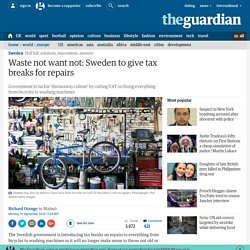
Sweden’s ruling Social Democrat and Green party coalition is set to submit proposals to parliament on Tuesday to slash the VAT rate on repairs to bicycles, clothes and shoes from 25% to 12%. It will also submit a proposal that would allow people to claim back from income tax half of the labour cost on repairs to appliances such as fridges, ovens, dishwashers and washing machines. “We believe that this could substantially lower the cost and so make it more rational economic behaviour to repair your goods,” said Per Bolund, Sweden’s minister for financial markets and consumer affairs and one of six Green party cabinet members.
Bolund has been a key figure in driving through the new incentives. But emissions linked to consumption have stubbornly risen. Transforming our world: the 2030 Agenda for Sustainable Development. Transforming our world: the 2030 Agenda for Sustainable Development Follow-up The High-level Political Forum on Sustainable Development is the central UN platform for the follow-up and review of the 2030 Agenda for Sustainable Development adopted at the United Nations Sustainable Development Summit on 25 September 2015.
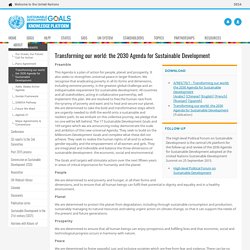
High-level Political Forum on Sustainable Development Preamble This Agenda is a plan of action for people, planet and prosperity. It also seeks to strengthen universal peace in larger freedom. Introduction 1. Sustainable Development Goals and targets 54. Goal 2. Transforming our world: the 2030 Agenda for Sustainable Development. Measuring the Value of Free by Charles Bean. LONDON – Reliable economic statistics are a vital public good. They are essential to effective policymaking, business planning, and the electorate’s ability to hold decision-makers to account. And yet the methods we use to measure our economies are becoming increasingly out of date. The statistical conventions on which we base our estimates were adopted a half-century ago, at a time when the economy was producing relatively similar physical goods. The trouble with GDP. ONE of Albert Einstein’s greatest insights was that no matter how, where, when or by whom it is measured, the speed of light in a vacuum is constant.
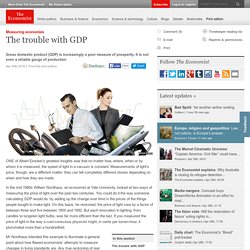
Measurements of light’s price, though, are a different matter: they can tell completely different stories depending on when and how they are made. Measuring the Value of Free by Charles Bean. Foresight. GDP: A Brief But Affectionate History. China seeks more balanced growth via new Gross Ecosystem Product index. 19 May, 2015 China seeks more balanced growth via new Gross Ecosystem Product index Beijing, (People’s Daily Online) May 18, 2015 – Gross Ecosystem Product (GEP), is a concept that complements and contrasts with GDP.
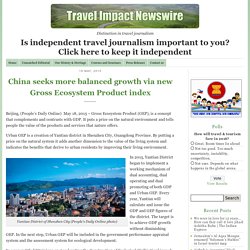
It puts a price on the natural environment and tells people the value of the products and services that nature offers. Urban GEP is a creation of Yantian district in Shenzhen City, Guangdong Province. Ecological Civilization. The Chinese government always attaches great importance to environmental protection, adopting a series of major measures in promoting sustainable development.
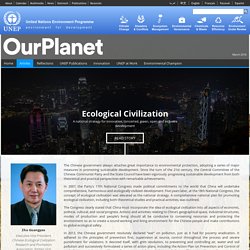
Since the turn of the 21st century, the Central Committee of the Chinese Communist Party and the State Council have been vigorously progressing sustainable development from both theoretical and practical perspectives with remarkable achievements. In 2007, the Party’s 17th National Congress made political commitments to the world that China will undertake comprehensive, harmonious and ecologically civilized development. Five years later, at the 18th National Congress, the concept of ecological civilization was elevated as the national strategy.
A comprehensive national plan for promoting ecological civilization, including both theoretical studies and practical activities, was outlined. In 2013, the Chinese government resolutely declared “war” on pollution, just as it had for poverty eradication. China seeks more balanced growth via new Gross Ecosystem Product index. Forbes Welcome. Application Standards. The Ecological Footprint Standards 2009 are the current operational standards that we use with all of our partners and businesses, including our 2016 Edition of the National Footprint Accounts.

The 2009 Standards build on the first set of internationally recognized Ecological Footprint Standards, released in 2006, and include key updates – such as, for the first time, providing standards and guidelines for product and organizational Footprint assessments. The Ecological Footprint Standards 2009 are designed to ensure that Footprint assessments are produced consistently and according to community-proposed best practices. They aim to ensure that assessments are conducted and communicated in a way that is accurate and transparent, by providing standards and guidelines on such issues as use of source data, derivation of conversion factors, establishment of study boundaries, and communication of findings.
Download the Ecological Footprint Standards 2009. en | fr| pt. Forbes Welcome.